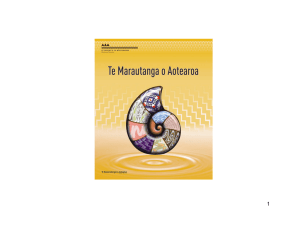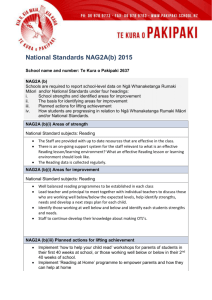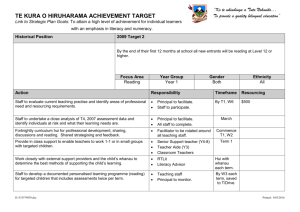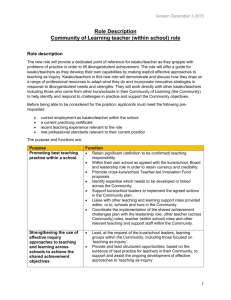Partnership School/Kura Hourua NEW SCHOOL ASSURANCE
advertisement
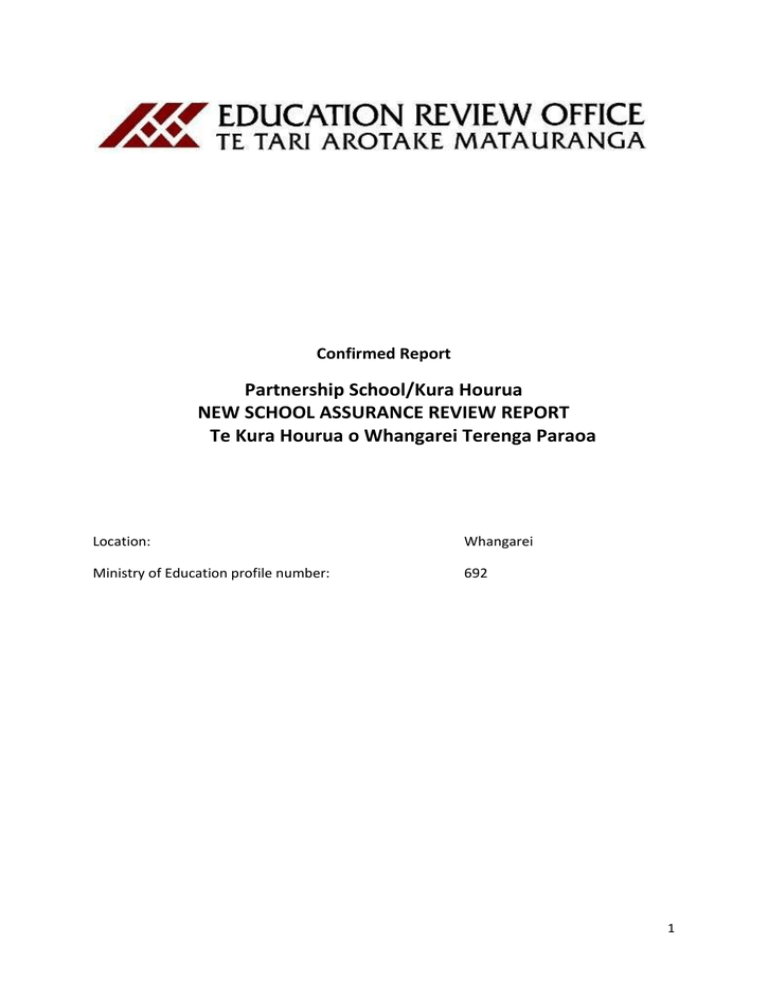
Confirmed Report Partnership School/Kura Hourua NEW SCHOOL ASSURANCE REVIEW REPORT Te Kura Hourua o Whangarei Terenga Paraoa Location: Whangarei Ministry of Education profile number: 692 1 Partnership School/Kura Hourua New School Assurance Review Report Te Kura Hourua o Whangarei Terenga Paraoa 1 Introduction A New School Assurance Review is a review of particular areas of school performance and is undertaken to specific terms of reference. New School Assurance Reviews are generally undertaken within the first year of the school’s opening. Terms of Reference This review is based on an evaluation of the performance of Te Kura Hourua o Whangarei Terenga Paraoa. The terms of reference for the review are to provide assurance to the community: that the school is well placed to provide for students that the school is operating in accordance with the vision articulated by the sponsor. 2 Context Te Kura Hourua o Whangarei Terenga Paraoa is one of the first five Partnership Schools Kura Hourua (PSKH) in New Zealand. These schools are a new type of school that are designed to bring together the education, business and community sectors to provide new opportunities for students to achieve educational success. The most significant difference between partnership schools and existing schools (both state and private) is that they are given increased flexibility to make decisions about how they operate and use funding to deliver specific targets. Each school is bound by its Partnership Contract with the Crown to deliver defined outcomes, particularly in regard to student achievement and engagement in learning. Quarterly reporting protocols are in place between the sponsor and the Ministry of Education. The performance of the school is also monitored by the PSKH Authorisation Board. 3 Background Te Kura Hourua o Whangarei Terenga Paraoa provides for students from Years 9 to 15. By the end of 2014 there were 52 students enrolled, all of whom are Māori. The sponsor’s vision is to provide education that allows young people to “be Māori; be educated; be rangatira”. The school’s sponsor is He Puna Marama Trust. He Puna Marama Trust has been operating successfully for some years. Previous provision for secondary school age students focused on providing support for boys enrolled at a number of Whangarei schools and taking part in an academy programme modelled on Company A of the Māori Battalion. The Trust is also an established provider 2 of early childhood education and intends to open a further PSKH to provide for learners from Years 1 to 6. The school curriculum is based on the vision, values and principles of The New Zealand Curriculum and Te Marautanga o Aotearoa. The school has Consent to Assess from NZQA and older students are acquiring achievement and unit standards for NCEA. The school premises are located in a converted industrial space and give ample space for all school activities. Versatile furnishing allows different activities to take place simultaneously. Seven full-time and part-time teaching staff are registered teachers. There is one unregistered part-time teacher. Students receive personal and business skills mentoring from He Puna Marama Trust staff. Careful processes are in place to ensure all adults working with students are police vetted. 4 Findings Students at Te Kura Hourua o Whangarei Terenga Paraoa are increasingly positive in their response to programmes that are designed to give them a strong foundation for further learning. The core philosophy of the school is that adults and young people will work together to build students’ personal responsibility for being successful learners. Maths, English, science, Te Reo Māori and physical education form the basis of the programme for all students. High priority is given to Māori language and culture. Students are very proud of the unit standards they have achieved in Māori performing arts. School leaders are determined that students will develop equal pride in their academic achievements in te reo Māori. The beginning and end of each day is marked by the gathering of all students for karakia and discussion of the day’s events. The school leader, the pouwhakahaere, uses these gatherings to reinforce the concept of whānau and to discuss key values consistent with the kura’s Code for Behaviour. Adults’ expectations are high and students are responding positively to the leadership opportunities available. Senior students are making pleasing progress. Ninety percent of students at Level 1 and 100 percent of students at Level 2 of NCEA have already achieved sufficient credits. External assessments will now determine whether students will be awarded merit or excellence certificates. Good use is made of external providers to ensure breadth in the curriculum. Students take part in programmes through NorthTec, Te Kura The Correspondence School and Te Wananga o Aotearoa, as well as a range of community organisations. School leaders are aware of the need to provide a curriculum that is engaging for learners and provides for individual extension and challenge. One of the challenges in developing the school was the difficulty of getting accurate or reliable data about students’ achievement levels on entry. Developing better systems for using diagnostic assessment tools is under way. Teachers are developing confidence in the use of electronic tools to record and analyse data, and this will allow them to build useful cumulative records of student achievement over the year. 3 The strength of the process for reporting to parents/whānau lies in the emphasis placed on meeting face-to-face to discuss all matters involving the learners, including their progress and achievement. There is good attendance at parents/whānau meetings. Teachers are aware of the need to improve their written reporting so that it provides helpful feedback and pointers about the way ahead, particularly for students at Years 9 and 10. As teachers build their confidence in using a range of assessment tools, records of achievement for students at Years 9 and 10 are likely to be more useful. Part of the sponsor’s vision is to provide young Māori with entrepreneurial and business skills that will serve them well in adult life. Staff from He Puna Marama Trust play a key role in mentoring and coaching students in these skills, and at the same time help to build a strong sense of whānau connection. Students report positively about these bi-weekly meetings. Organisational leadership is effective. There is a close working relationship between the Trust’s chief executive and the pouwhakahaere who leads the school. They share a commitment to the vision and the capacity to articulate this strategically. The recent appointment of an experienced ex-principal will help to build better understanding of assessment and curriculum in the school, and provide helpful guidance in implementing the desired model of teaching and learning. One of the ongoing challenges is finding staff with the right skills and disposition to teach in this modern learning environment. Current staff have developed collegial and supportive relationships amongst themselves and between themselves and students. The next step is to find ways to ensure that students are more purposefully engaged in learning at all times and that they have clearer views of their learning pathways. Ongoing work to develop curriculum documentation will be useful. Clarifying expectations of curriculum content and delivery will provide useful guidelines for teachers. Using available data to inquire into practice will provide a sound foundation for developing self review. There is a sound base of policy and procedure to guide school operations. In line with the kura’s philosophy of guiding behaviour by promoting shared values, there is an expectation that students and staff will always make safe and sensible use of the internet. School leaders should consider the wisdom of making these expectations more explicit. Sponsor assurance on legal requirements Before the review, the sponsor and pouwhakahaere of the school completed the ERO Sponsor Assurance Statement and Self-Audit Checklists. In these documents they attested that they had taken all reasonable steps to meet their legislative obligations related to: school management and reporting curriculum management of health, safety and welfare personnel management. During the review, ERO checked the following items because they have a potentially high impact on students' achievement: emotional safety of students (including prevention of bullying and sexual harassment) 4 physical safety of students teacher registration processes for appointing staff stand-downs, suspensions, expulsions and exclusions attendance. Conclusion Te Kura Hourua o Whangarei Terenga Paraoa has made a good start to providing education for young Māori consistent with its sponsor’s vision. Adults and young people are working together to develop confident, capable, resilient Māori learners. ERO is likely to carry out the first education review of the school after 12 months, as part of the regular review cycle for new schools. Dale Bailey Deputy Chief Review Officer Northern 16 February 2015 5 About the School Location Whangarei Ministry of Education profile number 692 School type Partnership School Kura Hourua School roll 52 Gender composition Boys Girls Ethnic composition Māori Review team on site October 2014 Date of this report 16 February 2015 35 17 100% 6
